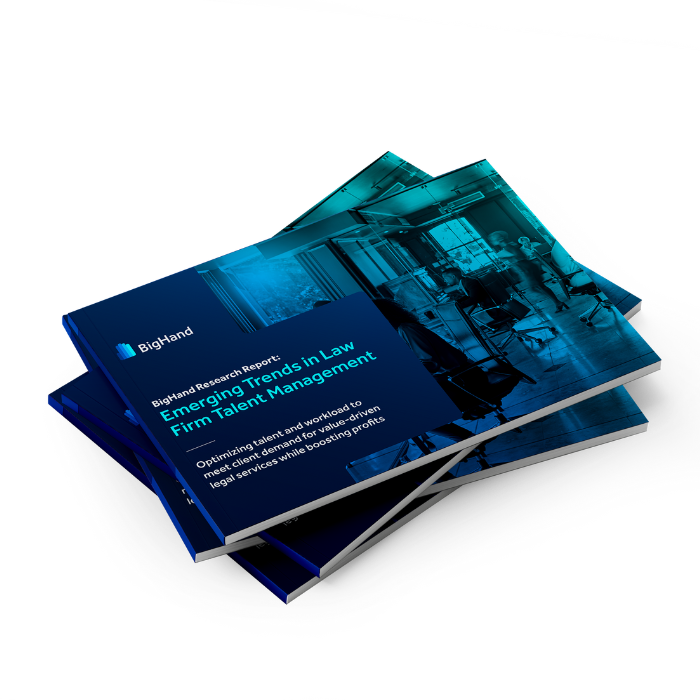Legal technology expert Duska Frink gives her thoughts on the data from the latest BigHand research report, Emerging Trends in Law Firm Talent Management.
What statistics stood out to you and why?
The first statistic that stood out to me was that 96% of firms have lost clients in the last 12 months. I think that firms really need to be thinking about the cost of support staff and how that is impacting the bottom line, and many firms don't have visibility into that. I think if 96% of firms have lost clients, we really need to be looking into that and understanding what support staff is costing the firm. If we're losing clients, that means we're not going to be as profitable.
The other stat that stood out to me was 31% of firms measure matter efficiency and profitability. Only 31% of firms is interesting if you think about the previous stat that I mentioned as we're not actually fully understanding profitability around a matter because we oftentimes have no idea how much support staff are actually attributing to that cost. Then we also have lawyers who are doing their own admin work, and sometimes we're not measuring that either. So I think it's crucial that we have that data to help us understand how profitable our matters actually are.
How important is it for law firms to shift towards a data-led approach in managing support staff productivity?
If you do not understand the cost of what support staff are attributing, we really aren't able to properly understand how profitable we are on a matter or for a client. Support staff are one of the highest costs in a firm, and we're often blind on how much that's actually costing the firm from a matter of client perspective. It's extremely important that we have that information so that we can lead with a more data led approach.
How can firms address gaps in career development for support staff?
I think number one, you have to look at the staff you have. You have to look at who's going to be retiring, you have to plan for attrition, because that's inevitable, especially based on the statistics in the report.
Then you have to think about, what does the next five years look like? What talent pool is out there? Are we going to be pulling talent from other firms, which is extremely difficult, or are we going to be considering how we're going to bring in new talent and offer a more clearly defined career path, which ideally, we've got a tiered structure to be able to offer that.
Bringing somebody in, a junior, giving them experience, showing them that they have the ability to learn new things and eventually move up into a second or third year role is part of this. I think having that career path is crucial to bringing in new talent into firms.
What steps can law firms take to improve task delegation and ensure optimal use of support resources, especially in a hybrid working environment?
In a hybrid working environment you lack visibility, and it's not about trusting what people are doing. It's about optimizing what they're doing. So I think it's crucial that we have that visibility into what they're doing, and having a system to do that efficiently.
It can't just be done in an email inbox. You need a proper workflow system to properly delegate the work, so making sure it's going to the right people. There are certain tasks you can't do at home, so you want to make sure that that workflows to those that might be in the office that day.
You have to have data to be able to inform your hybrid working environment, and you need to be able to offer that hybrid working environment going forward. It's not going to go away, especially when we think of the type of talent that we are having to hire today. They are going to be expecting a hybrid working model, or otherwise, that talent will go to another firm that's offering it. So there's a lot to consider there when thinking about hybrid and how we're going to sustain that in the future.
What advice would you offer firms as they adopt workflow management technology?
My advice would be looking at where you can potentially centralize tasks. Firms I talked to do a couple of things that they all consider initially would be billing. You can look at document related work. Even if you have one person that you know loves to do document related work, start centralizing that work to them.
Start small if you're a smaller firm. If you're a larger firm, think about teams that are already working in more of an organic type team environment, and they would be looking for a tool to help make the process that they already have efficient.
Most firms, if they don't have workflow tech, they're using centralised inboxes, which are extremely inefficient. Yes, it brings a centralisation component to it, but it doesn't give you data, and it doesn't offer workflow visibility like a workflow system actually would.
For me, it's about looking at the firm holistically. But also starting small, landing and expanding once you know, because you're never going to know the full plan, it's going to evolve. So it's better, I think, to start out small and then let that plan evolve based on the data that you get from a workflow system.







